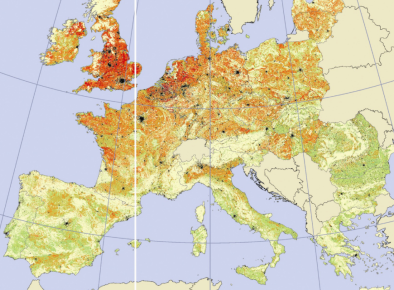Surging towards Decline: GDP Growth and the Collapse of our Greatest Asset - our Ecosystems
Published: Jun 14, 2023 Reading time: 6 minutes Share: Share an articleWhy do we still hear that nature conservation is incompatible with economic growth? The reality is precisely the opposite. Our prosperity depends directly on the health of our ecosystems.

Have you ever heard it said that "ecology doesn't pay"? Or "isn't protecting nature expensive"? Or that the negative impacts of the green transformation need to be evaluated? Certainly, many of us have, but the reality is quite the opposite—our well-being depends directly on the state of our ecosystems. Our dependence comes from the fact that most of our marketable products come from healthy and functioning nature: food, wood, fibres, and medicines. Ecosystems are humanity's basic means of production, yet they have no quantifiable value in terms of current economic indicators, which portray them as inexhaustible. Yet experts have been warning for decades that the growth in consumption of natural resources has outstripped the planet's carrying capacity.
The decline and decay of ecosystems will inevitably bring with it a decline in the performance of the global economy, whether in the form of falling yields or damage wrought by climate disasters. Although we have, in fact, lost two-thirds of our biodiversity over the last 50 years, contemporary economists continue to assess economic development in terms of steady growth. But this is a very dangerous illusion.
Economists' Dreams vs the Sad Reality
Widespread use of chemicals, clearing of forests and native ecosystems, and the cultivation of monocultures; these interventions result in the degradation of the means of production of economic commodities, and their disappearance brings substantial additional costs: the need to artificially pollinate, provide irrigation because of drought, and treatment of land with pesticides.
Although it may appear from national reports that certain economies are growing and people are becoming richer, it can be clearly demonstrated that we are becoming catastrophically poorer in terms of natural capital—that is, the ability of our biosphere to provide the goods upon which our economy is based. While contemporary economists do not calculate the value of the biosphere, ecologists and other experts can calculate and monitor the health of the planet's ecosystems. For several decades, satellites have assessed how much biomass plants create during photosynthesis, how much water they evaporate through evapotranspiration, and their overall health.
We would expect that there would be an effort to maintain ecosystems at the highest level of productivity, primarily through advanced knowledge of agriculture, technological means and artificial substances. However, we are seeing instead that the impacts of human activity lead to a decline in the planet's ability to provide the ecosystem functions necessary for life - particularly the production of food and materials, protection from extreme weather events, and cooling through evapotranspiration. Over several decades, we have deliberately destroyed vast tracts of ecosystems to build cities, plant monocultures, or leave them barren. We have replaced highly productive areas with inferior, unproductive or low-productivity land use types. The rate at which humans have transformed the face of our Earth over the past decades is genuinely distressing, and we can assess the impact of this transformation using satellite measurements (Figure 1).
Productivity decline in the Czech Republic
Ecosystem productivity is also declining in the Czech Republic. Based on measurements we undertook, we have observed a surprising paradox: the most fertile areas are the least productive and vice versa. Due to years of ruthless extraction, prime agricultural lands in the lowlands of the two main rivers are far less productive than in areas with a predominance of poorer classes of soils—such as brown soils. Yet, these are the most suitable areas for agricultural production. Decades of unsustainable industrial exploitation have led to mass deforestation, soil erosion, and fertility loss, thus increasing vulnerability to extreme weather. These are signs of poor resource management and the progressive destruction of the foundations of our country's prosperity.
Poverty masquerading as wealth
Our planet and lands are getting poorer as fewer crops, trees, and grass grow every year. Less material for the manufacturing sector means rising prices and economic slowdowns. How is it possible that this deepening debt is not reflected in the national accounts? According to experts, the performance of a country's economy is measured by indicators that quantify the amount of products and services produced in a given territory at a given time. In other words, indicators of economic performance such as gross domestic product (GDP) measure how much natural capital has been consumed and, therefore, in effect, how much the potential of ecosystems to produce tradable goods has declined. Although economists and politicians pass off GDP as a positive measure, the opposite is true. It is a reflection of the extent to which ecosystems have lost their ability to continue to feed us.
Economics as the art of making money
But how is it possible that modern economics cannot deal with such an obviously vital variable as the state of ecosystems and the ability to produce tradable goods?
The problem lies in distinguishing real economics from the mere accumulation of money. The ancient Greeks distinguished between two concepts that we now conflate: economics (oikonomos), the discipline of the economical use of resources, and chrematistics (chrema), the art of making money. And the current understanding of economics, according to politicians and economists, is often just the discipline of making money. Real economics has not yet been invented, but we need it acutely. Our economic models will never be able to serve as tools for real economic health unless they include the ability of ecosystems to produce the goods on which the economy is based. What is now called capitalism is a doctrine based on the depletion of natural wealth and will eventually lead to collapse. It is an ideology of debt that is publicly passed off as wealth.
That the state of nature and our wealth are intimately linked is clear even to children. Yet, today there is virtually no one who does not put a contradiction between nature and wealth—ecology and economics are connected vessels that one cannot function without the other. So the next time you hear that ecology is expensive and for the rich, remember that almost everything of any economic value comes from healthy nature. Nature's ability to produce valuable goods keeps us alive and relatively well.
This article was written for WHAT magazine.


